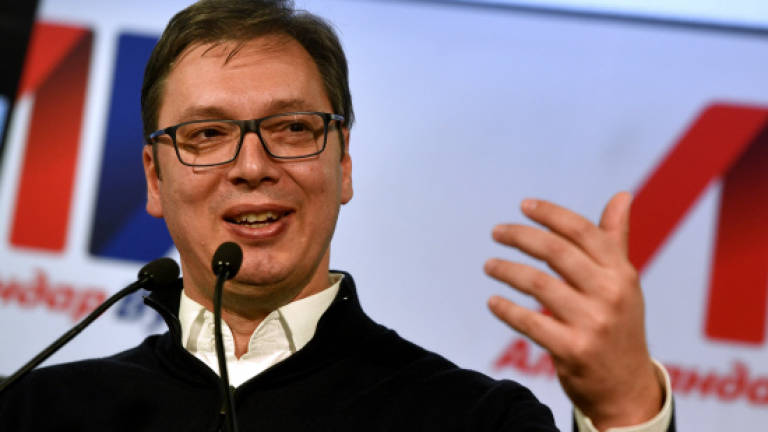Serbian PM Vucic wins presidency to confirm EU path

BELGRADE: Prime Minister Aleksandar Vucic has won Serbia's presidential election in the first round, nearly complete official results showed Monday, enabling him to push forward with his plan to lead the Balkan country into the European Union.
Vucic won about 55% of Sunday's vote, clearing the 50% threshold required to win in the first round, according to results released by the electoral commission based on more than 90% of polling stations.
Two obstacles for EU membership talks, started in 2014, seem to have been removed.
Vucic's predecessor Tomislav Nikolic, a pro-Russian member of Vucic's own Serbian Progressive Party (SNS), is likely to retire from political life.
And ultranationalist Vojislav Seselj, who was burning European flags to show his opposition to Serbia's EU bid, won less than 5% of the vote.
But Vucic, a 47-year-old hardline nationalist turned pro-European, still has to overcome the reluctance of a large chunk of his electorate who remain attached to historic ties with Moscow and have little enthusiasm for joining the EU.
Political analyst Jadranka Jelincic noted that EU membership talks "require notably changes to the constitution and maybe new prerogatives for the president".
He has, however, a little time to win around support, with the next major electoral challenge – parliamentary elections – not due until 2020.
In the meantime, "we will see a sort of 'presidentialisation' in Serbia", independent analyst Boban Stojanovic predicted.
"I expect Vucic will have the final say in all decisions."
2022 horizon
Analysts suggest Vucic's replacement as prime minister – a post he has held since 2014 – will have to be someone who he trusts would lead the government in the same political direction.
"The vast majority of Serbia's citizens are for the continuation of reform, for Serbia to keep to its European path and maintain the links that we have with Russia and China," a thrilled Vucic said late Sunday.
Balkans specialist Loic Tregoures said in an analysis published by The Conversation website that "Vucic also expects to be the president who will lead Serbia into the European Union, which is a plausible hypothesis around 2022" when his mandate will expire.
Both Russian President Vladimir Putin and EU Enlargement Commissioner Johannes Hahn congratulated Vucic on Monday.
Putin said Vucic's victory "testifies to the wide support for your efforts aimed at resolving current economic and social problems ... and pursuing a constructive, balanced foreign policy", according to a Kremlin statement.
Hahn meanwhile said in a tweet: "Looking forward to working with new president as partners and friends on EU accession."
Vucic "has been presenting himself as a pro-European ever since he took power, and gave significant signs of his involvement, such as the 2013 Belgrade-Pristina agreement" on normalisation of ties with Kosovo, Tregoures said.
Unlike most EU members, Serbia refuses to recognise the independence of Kosovo, its former province populated mostly by ethnic Albanians, declared in 2008.
Normalisation of ties between Belgrade and Pristina is key for the path to EU accession.
With Belgrade currently negotiating judicial and fundamental rights with Brussels, no EU official voiced reserve over Vucic's campaign despite opposition claims that he is authoritarian and controls the media with an iron fist.
After his win, Serbia's divided opposition seems weak.
Sasa Jankovic, an independent candidate supported by the centre-left Democratic Party, placed second with just 16% of the vote, garnering support from the urban middle class and liberals opposed to Vucic, in large part by criticising the authorities and insisting on their accountability.
Despite Vucic's convincing victory, hundreds of protesters – many of them students – took to the streets of Belgrade on Monday night to denounce him, shouting "Vucic, thief!" and "You're not my president".
A fresh protest has been called for Tuesday night, while similar demonstrations took place Monday in the city of Novi Sad to the north and Nis to the south. — AFP